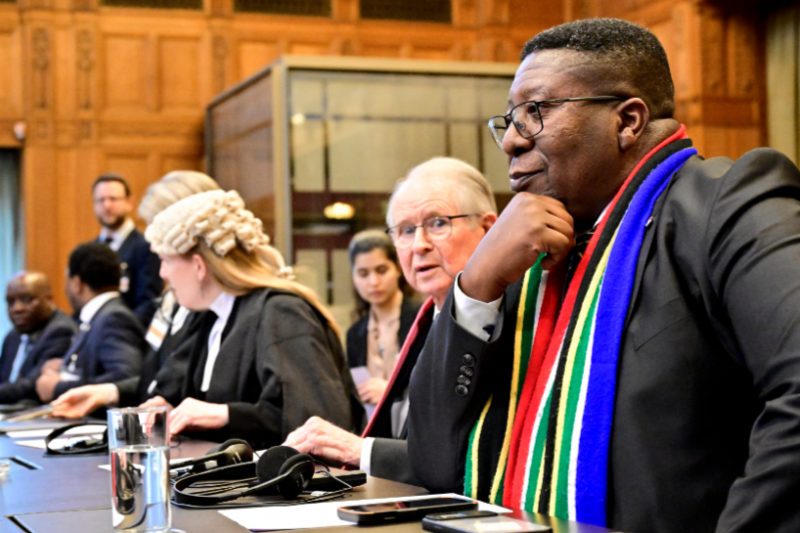
South African ambassador to the Netherlands Vusimuzi Madonsela (R) attends a hearing at the International Court of Justice (ICJ) as part of South Africa's request for a Gaza cease-fire in The Hague, on May 24, 2024. (Credit: Nick Gammon/AFP)
The International Court of Justice ruled on Friday that Israel “immediately halt” its military offensive in the Rafah governorate, a landmark ruling likely to increase mounting international pressure on Israel more than seven months into the Gaza war.
During the afternoon session in The Hague, Judge Nawaf Salam, president of the ICJ, said that the situation in Rafah has “deteriorated further” and is now classified as “disastrous.” To this end, Salam said, on behalf of 13 of the 15 international judges on the panel, the ICJ is handing down additional measures against Israel, having found that Israel’s efforts at evacuating and protecting civilians in Gaza were “insufficient."
“Israel must immediately halt its military offensive and any other action in the Rafah governorate which may inflict on Palestinian group in Gaza, conditions of life which would bring about its physical destruction in whole or in part.”
In addition — "Israel must take measures to ensure unimpeded access into Gaza Strip" for investigators and fact-finding missions mandated by the UN, Salam stated, and "must submit a report on measures taken within one month." Israel's follow-up report on the measures issued by the ICJ in January was drafted by its Justice Ministry and Foreign Ministry and was not released to the press or the general public.
The Court also ordered Israel to keep open the Rafah crossing into Gaza for the "unhindered" provision of humanitarian aid.
ICJ rulings are legally binding but the Court has no concrete means to enforce them. For example, it ordered Russia to halt its invasion of Ukraine, to no avail.
Israel had argued before the Court that an order to stop military activity would give free rein to Hamas and prevent its army from rescuing hostages taken in the group's Oct. 7 attack. Israel's Rafah offensive is widely unpopular both within Israel, where, according to a recent poll, more than half the population prefers a cease-fire deal over the Rafah invasion — as well as internationally, where even Israel's closest ally has been a prominent voice warning of the catastrophic consequences of an attack on the southern Gaza city.
The ICJ ruling comes hot on the heels of another highly charged decision Monday by the International Criminal Court prosecutor to seek arrest warrants for top Israeli and Hamas leaders.
Prosecutor Karim Khan alleged that senior Israeli leaders, including Prime Minister Benjamin Netanyahu, plus top Hamas officials, were guilty of war crimes and crimes against humanity related to the war on Gaza and the Oct. 7 attack.
'Israel's genocide has continued apace'
South Africa brought the case before the ICJ last year alleging that Israel's Gaza offensive breached the 1948 UN Genocide Convention — a charge strongly denied by Israel.
In a ruling on Jan. 26 that made headlines worldwide, the ICJ ordered Israel to do everything it could to prevent acts of genocide during its military operation in Gaza.
But South Africa has since returned several times to the ICJ arguing that the dire humanitarian situation in Gaza compels the court to issue further fresh emergency measures.
The court did so in March, ordering new measures compelling Israel to ensure the "unhindered provision at scale" of humanitarian aid.
In public hearings last week, South Africa's ambassador Vusimuzi Madonsela alleged that "Israel's genocide has continued apace and has just reached a new and horrific stage."
"Although the present application was triggered by the unfolding situation in Rafah, Israel's genocidal onslaught across Gaza has intensified over the past few days, also warranting the attention of this court," he said.
South Africa argued the only way to enable humanitarian aid in to ease the crisis in Gaza was a full halt to Israel's military operations.
In January, as the ICJ was hearing South Africa present its case, Netanyahu told a press conference that nothing would stop Israel's military offensive. “No one will stop us – not The Hague, not the Axis of Evil, and no one else,” Netanyahu said, cited by Jerusalem Post.
The court will take months if not years to rule on the broader South African genocide case but it can order urgent measures while weighing its decision.
Israle's legal team claimed that Israeli authorities were "acutely aware" of the suffering of civilians in the Gaza Strip and that they have made "extensive efforts" to increase humanitarian aid flowing.
Truce talks resume
Israel said Thursday it was ready to resume stalled talks on a truce and hostage release deal with Hamas, as Netanyahu faces growing domestic pressure to secure their freedom.
US intelligence chief Bill Burns is expected to meet Israeli representatives in Paris to relaunch negotiations, according to a Western source close to the issue.
Previous talks in Cairo and Doha attended by Qatar and Egypt as mediators for Hamas broke up earlier this month.